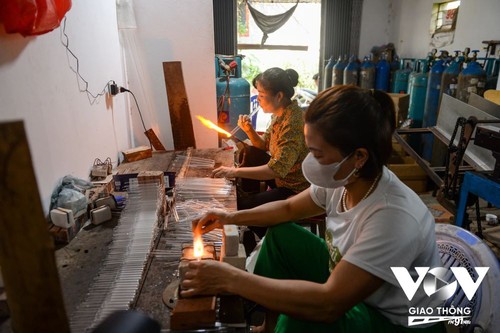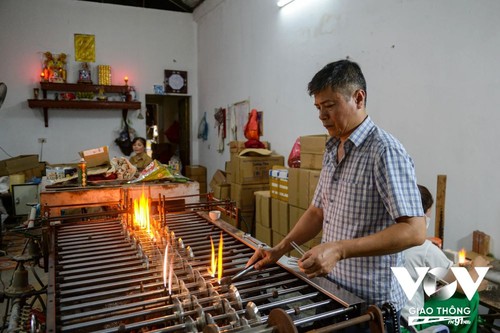 Despite the hot summer weather, Ta Thi Nga's glassblowing workshop in Thong Nhat commune keeps running. Despite the hot summer weather, Ta Thi Nga's glassblowing workshop in Thong Nhat commune keeps running. |
In the 40-degree Celsius heat of a small workshop in Giap Long village in Thong Nhat commune, Dang Van Tho sits at a table with a blowtorch dexterously manipulating his glass creations. Tho has been engaged in glassblowing for nearly 40 years, ever since his father passed down the craft to him when he was young.
“I remember, when I was 6 or 7 years old, I saw my father doing the craft. When I was 13 years old, I started to follow the profession. It was a very primitive work, mainly using oil and steam,” Tho recalled, adding, “Now we use gas and oxygen. We used to make medicine tubes mainly. We’ve improved our skills and now produce a variety of products. Each glassblowing household in Thong Nhat makes a different product.”
To create beautiful, high-quality products, careful preparation must begin with the first step of selecting raw materials. The glass tubes must be guaranteed not to stain and are classified by their color of yellow or white.
Depending on the product’s requirements, the production process – blowing, pressing, pulling, rolling – can be different. But the general rule is to first melt the glass. Then the worker blows on the glass and uses his hands to twirl it and shape it as desired.
Workers have to work in harsh conditions next to a fire with temperatures reaching 1,000 degrees Celsius, winter or summer, said Tho. According to Tho, the temperature of the fire depends on the product and took the making of a light bulb as an example.
“You need a low temperature of 600 to 700 degrees Celsius. But to make a lamp or flower vase, the temperature increases to 800 or 900 degrees Celsius. The proper fire depends on the product. Because I understand each product well, I can accurately adjust the fire,” Tho confides.
Glassblowers, in addition to being skillful, need to have patience and keen concentration. It’s a dangerous job. Workers are often exposed to fire and even a small mistake can cause a severe burn. Glassblowers Dang Van Tho and Ta Thi Nga agree that only those who truly love the craft can stick with it for a long time.
 Using modern machinery has increased the productivity of households in Thong Nhat commune. Using modern machinery has increased the productivity of households in Thong Nhat commune. |
In the past, everything was done manually. Product quality depended completely on technique, experience, talent, and aesthetic taste. Today, many households have invested in modern equipment.
Luong Van Trai, the owner of the Thong Nhat glass factory, said, “We began to use machines to replace workers in 2018. All our machines are imported. They allow us to produce more products, maintain consistent quality, and keep our prices lower.”
Using modern machinery has helped households increase productivity many folds without hiring more workers. But the machines are only used to make simple products. For sophisticated products with more detail, the skillful hands and breath of the artisan remain indispensable, said Trai. He added, “The craftsman’s technique is the most important factor. In manual processing, human artistry is more important than anything else.”
Luong Tuan Nghia, who was born and raised in Thong Nhat commune is the third generation of a glassblowing family. He observes his father every day to learn the trade. “I’m a newbie so there are many problems. When you make glass products, your hands must be flexible. When you are a beginner, your hands are too stiff and the final products are not beautiful. I’m learning gradually. In the future, I want to make more decorative glass items and develop glass tubes for the medical sector,” Nghia told VOV.